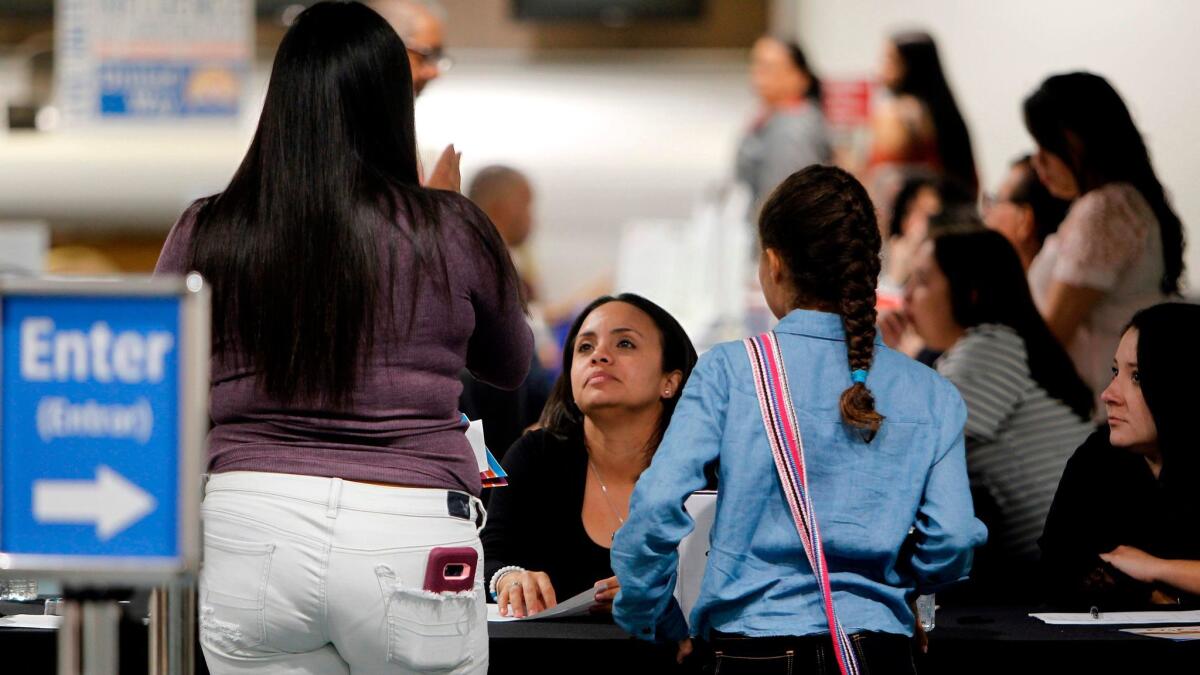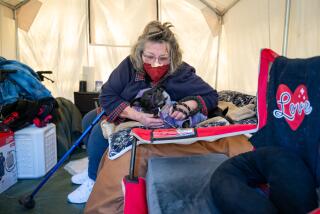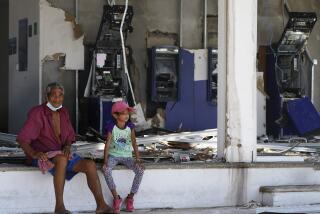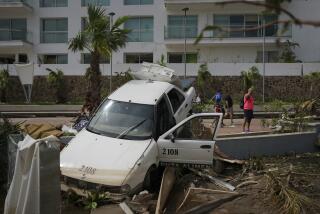The flow is receding, but Puerto Rican evacuees are still pouring into Florida

Ashley Mendez arrived in Orlando before sunrise Thursday, her eyes red from crying, a single duffel bag holding all her worldly possessions. The 20-year-old already ached for her mother, left behind in Puerto Rico.
She made her way through a special welcome center at Orlando International Airport set up by the state, proceeding stoically until she traded in her Puerto Rican identification card for a Florida ID, and a worker snipped the old one in half — a symbolic death to her former, familiar life. Then, the blood seemed to drain from her face.
“What if I want to go back?” she said.
Raquel McCormick of the Heart of Florida United Way wrapped her arms around the young woman and held her as she began to sob. “This is not forever,” McCormick said. “It’s only forever if you want it to be.”
It was a scene that has played out in varying forms since Hurricane Maria devastated Puerto Rico in late September, prompting tens of thousands to leave the island for Florida — either temporarily or permanently. More than two months later, a wave of suffering, desperation and hope continues to wash through this corner of the Orlando airport, one of two state-operated welcome centers in Florida. It is tucked beyond a large black curtain near the first-floor rental cars and staffed at one point by 27 government agencies and charities.
Here, the newest Central Florida residents can get help with housing, health needs, school enrollment, employment, driver’s licenses and federal aid.
“In the beginning, it was seven days a week, 9 in the morning to 7 at night, and we were full every day, with people lined up down the hall,” said McCormick, operations director for the local United Way. “If families got in late at night, they would sleep on the benches here and be waiting for us to open in the morning. There was never a dull moment.”
Some came with no idea where they would live or how they would make a living. They knew only that they couldn’t stay in Puerto Rico.
“We lost everything,” said Ana Soler, 47, who flew to Orlando with her husband Oct. 10 and was back at the airport Wednesday to greet her two grown children and their children as they arrived from the island. “We lost our home, our furniture, our jobs. I tell my husband, ‘We have to go [to Orlando].’ ”
Now, seven of them are in a single hotel room, but Soler and her husband have already found jobs and are saving for a house. Once a regional sales manager, she is now a food court cashier at a turnpike rest stop. Her husband, a warehouse supervisor, is working construction on Interstate 4, putting in 10 hours a day, six days a week.
“I cry a lot,” Soler said. “But I work more than I cry. You have to put all your effort into it.”
At the welcome center, she and more than 800 others have found help with temporary housing while evacuees await approval from the Federal Emergency Management Agency. At first, the process took a couple of weeks. Now, it is about 48 hours.
“Most importantly for us, we wanted to make sure people had a place to sleep,” McCormick said. “We didn’t want them to be homeless.”
The center also had paramedics on standby as passengers arrived needing insulin, oxygen — even surgery.
At recently as last week, the medically fragile continued to arrive at the center, though paramedics are no longer stationed there.
Flights from the island to Orlando are booked through January.
The numbers flooding into the welcome center have dropped since the first weeks — when more than 1,000 a day were seeking help — and the hours have been scaled back. But there is still a steady stream of arrivals. One day last week, 323 people came in, some for the first time, others returning for more answers.
“Within our culture, no matter what the circumstances are, we’re going to stay together to celebrate the holidays,” said McCormick, whose family is from Puerto Rico. “So we think we’re going to see another influx in January. We are preparing for Phase 2.”
By then, Mendez hopes to be enrolled in college. Her father, Gilbert Mendez, who has lived in nearby Melbourne since Ashley was a toddler, has found a two-bedroom apartment there where they will live.
To prepare for her arrival, he bought her a bedroom set, a TV and girlish curtains he thought would comfort her.
Gilbert Mendez looked at his daughter crying and began to cry himself.
“I know she misses her mother,” he said. “Once, we were like a chain — and all of a sudden the chain has broken.”
Santich writes for the Orlando Sentinel.
More to Read
Start your day right
Sign up for Essential California for news, features and recommendations from the L.A. Times and beyond in your inbox six days a week.
You may occasionally receive promotional content from the Los Angeles Times.






